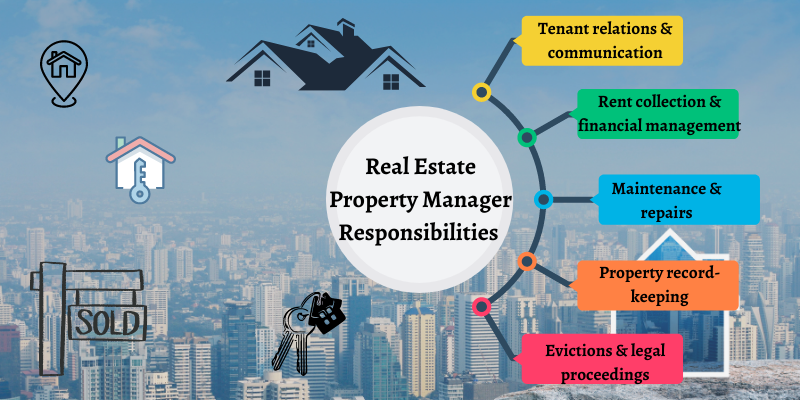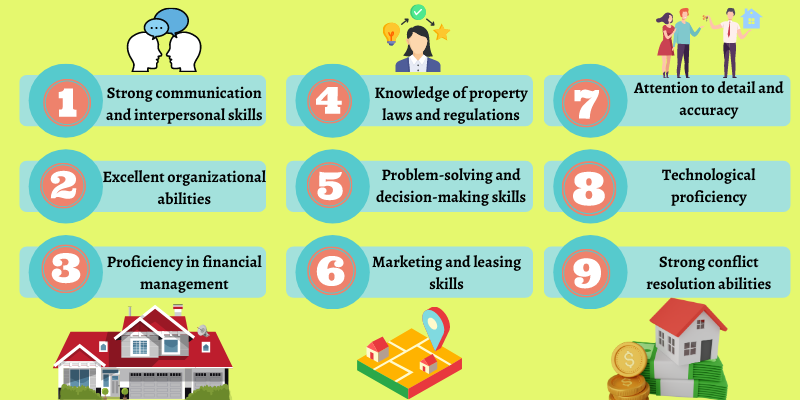Real estate property managers play a vital role in the UAE market, overseeing properties’ day-to-day operations and maintenance on behalf of owners and investors.
Understand what Real Estate Property Managers do and why their role is essential in the property management industry.
From tenant relations and rent collection to property maintenance and financial management, property managers handle various responsibilities to ensure real estate assets’ smooth and efficient functioning.
Understanding the significance of their role is crucial for property owners, investors, and tenants alike.
Join us as we delve into the day-to-day tasks, skills required, and real estate property managers’ impact on the UAE property market.
Discover how their expertise and professional management contribute to successful property investment and sustainable returns.
Responsibilities of a Real Estate Property Manager
Real estate property managers play a vital role in the smooth operation of tenant and building management. They are responsible for the following tasks:
- Tenant relations and communication
- Rent collection and financial management
- Maintenance and repairs
- Property administration and record-keeping
- Evictions and legal proceedings
Let’s explore each of these responsibilities in detail so you can understand the job description of a real estate property manager.
1. Tenant Relations and Communication
Real estate property managers manage tenant relations and facilitate effective communication.
This includes handling tenant inquiries, addressing complaints, and resolving conflicts promptly and professionally.
They also play a crucial role in facilitating lease renewals, move-ins, and move-outs, ensuring a positive tenant experience.
2. Rent Collection and Financial Management
One of the key responsibilities of real estate property managers is rent collection and financial management.
They set rental rates, collect tenant rent payments, and monitor and enforce timely payments.
Additionally, property managers handle budgeting, financial reporting, and expense management for the property, ensuring proper financial oversight.
3. Maintenance and Repairs
Real estate property managers oversee the maintenance and repairs of the property.
They conduct regular inspections to identify maintenance needs, coordinate with contractors for repairs and renovations, and ensure preventative maintenance measures are in place.
In emergencies, property managers respond promptly to address any issues.
4. Property Administration and Record-Keeping
Efficient property administration and record-keeping are essential responsibilities of real estate property managers.
They document lease agreements, maintain tenant communications, and maintain maintenance activity records. Property managers also maintain accurate financial records and prepare reports for property owners.
Additionally, they handle property-related administrative tasks such as insurance and tax documentation.
5. Evictions and Legal Proceedings
When eviction becomes necessary, real estate property managers handle the eviction process in compliance with local laws and regulations.
They represent property owners in legal proceedings if required and ensure that all necessary steps are taken to resolve tenant disputes and legal issues fairly and lawfully.
Professional Qualifications and Education of a Real Estate Property Manager
As a real estate property manager, having the right qualification and education is crucial to oversee and manage properties effectively. Here are some professional qualifications and education that are essential for success in this role:
- A bachelor’s degree in real estate management, business administration, or a related field is preferred but not always required.
- Completing real estate property management courses or certifications can provide specialized knowledge and enhance job prospects.
- Familiarity with relevant laws, regulations, and local market practices is essential.
- Strong knowledge of property management software and tools for efficient operations.
- Excellent communication, negotiation, and problem-solving skills.
- Proven experience in property management or related roles is highly valued.
- Continuing education and professional development to stay updated on industry trends and best practices.
Remember, studying real estate is an ongoing process, and seeking professional guidance and training can significantly enhance your proficiency as a property manager.
9 Skills for Real Estate Property Manager
As a real estate property manager, possessing specific skills is essential for effectively managing properties and ensuring smooth operations. Here are some essential skills that are crucial for success in this role:
- Strong communication and interpersonal skills
- Excellent organizational and multitasking abilities
- Proficiency in financial management
- Knowledge of property laws, regulations, and lease agreements
- Problem-solving and decision-making skills
- Marketing and leasing skills
- Attention to detail and accuracy
- Technological proficiency
- Strong negotiation and conflict resolution abilities
Take the next step in your real estate property manager career by exploring these steps in detail!
1. Strong Communication and Interpersonal Skills
Effective communication and interpersonal skills are crucial for real estate property managers to interact with tenants, property owners, contractors, and other stakeholders.
Clear and concise communication ensures that all parties are well-informed, expectations are managed, and issues are addressed promptly.
Additionally, strong interpersonal skills allow property managers to build rapport, establish trust, and maintain positive relationships with tenants and property owners.
2. Excellent Organizational and Multitasking Abilities
Real estate property managers handle various responsibilities simultaneously, such as tenant relations, financial management, property maintenance, and administrative tasks.
Therefore, excellent organizational and multitasking abilities are essential to prioritize tasks, meet deadlines, and ensure efficient property management operations.
Effective organization skills also help property managers maintain accurate records, track lease agreements, and handle various documentation.
3. Proficiency in Financial Management
Financial management skills are critical for real estate property managers to effectively handle rental income, budgeting, and expense management.
Property managers should be capable of setting appropriate rental rates, collecting rent payments, and ensuring timely disbursement of funds to property owners.
Moreover, they should be able to create and analyze financial reports, manage property-related expenses, and conduct regular financial audits.
4. Knowledge of Property Laws, Regulations, and Lease Agreements
Real estate property managers must comprehensively understand property laws, regulations, and lease agreements.
This includes knowledge of local rental laws, fair housing regulations, property maintenance standards, and other legal requirements.
By staying informed about these laws and regulations, property managers can ensure compliance, mitigate legal risks, and protect the rights of tenants and property owners.
5. Problem-Solving and Decision-Making Skills
Property management involves addressing various challenges and making sound decisions promptly.
Property managers need strong problem-solving and decision-making skills to handle tenant issues, property maintenance concerns, emergencies, and other unforeseen circumstances.
Property managers can maintain smooth operations and enhance tenant satisfaction by evaluating situations, analyzing options, and implementing effective solutions.
6. Marketing and Leasing Skills
When attracting and retaining tenants, marketing, and leasing skills are valuable for real estate property managers.
Property managers should understand the local market, target audience, and effective marketing strategies.
They should be able to create appealing property listings, conduct property showings, screen potential tenants, and negotiate lease agreements to ensure a successful leasing process.
7. Attention to Detail and Accuracy
Attention to detail is essential for real estate property managers to manage various property-related documents, contracts, and financial records.
Property managers must ensure accuracy in lease agreements, rental payment records, property inspection reports, and other documentation.
Attention to detail also enables property managers to promptly identify potential maintenance issues, address tenant concerns, and maintain high property upkeep standards.
8. Technological Proficiency
Real estate property managers should use technology and property management software proficiently in today’s digital age.
They should be able to leverage technology to streamline processes, track property performance, manage tenant databases, and handle online marketing and communication.
Proficiency in technology allows property managers to stay organized, improve operational efficiency, and provide better service to tenants and property owners.
9. Strong Negotiation and Conflict Resolution Abilities
Negotiation and conflict resolution skills are essential for real estate property managers to handle various situations effectively.
Whether negotiating lease terms, resolving tenant disputes, or working with contractors, property managers should be skilled in finding mutually beneficial solutions and managing conflicts.
Strong negotiation and conflict resolution abilities contribute to maintaining positive relationships with tenants, property owners, and other stakeholders.
Conclusion
Becoming a successful real estate property manager requires a combination of skills and knowledge. So you need to understand what Real Estate Property Managers do.
From strong communication and organizational abilities to financial management and problem-solving skills, each aspect is crucial in effectively managing properties and ensuring tenant satisfaction.
Additionally, a solid understanding of property laws, regulations, and lease agreements is vital to navigating the legal aspects of property management.
To excel in this field, developing and enhancing these skills is essential. Seeking professional guidance and training can provide you with the necessary knowledge and expertise to thrive as a real estate property manager.
ThinkProp’s real estate training programs offer comprehensive resources and industry insights to help you sharpen your skills, stay updated with industry trends, and excel in your career.
Whether you are a newcomer or an experienced professional looking to enhance your skills, investing in professional training can significantly impact your career trajectory.
ThinkProp provides a platform to learn from industry experts, gain practical experience, and network with like-minded professionals.
Don’t miss out on the opportunity to boost your real estate property manager career. Take the next step and explore ThinkProp’s real estate training programs.
Equip yourself with the skills, knowledge, and confidence needed to succeed in this dynamic industry.
Real estate offers exciting opportunities with lucrative salaries, so start your journey to becoming a licensed real estate professional today!









